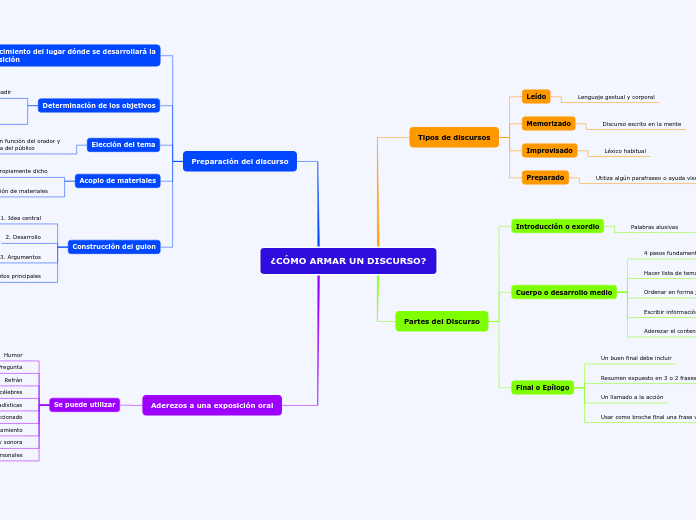¿CÓMO ARMAR UN DISCURSO?
In linguistics, syntax is the set of rules, principles, and processes that govern the structure of sentences in a given language, usually including word order.
Aderezos a una exposición oral
A compound sentence is a sentence that has at least two independent clauses joined by a comma, semicolon or conjunction. An independent clause is a clause that has a subject and verb and forms a complete thought.
Se puede utilizar
When independent clauses are joined with coordinators (also called coordinating conjunctions), commas and semicolons, they do more than just join the clauses. They add meaning and flow to your writing.
Anécdotas personales
Época visual y sonora
Referencia al pensamiento
Leer un texto seleccionado
Porcentajes y estadísticas
Frases célebres
Refrán
Pregunta
Humor
Preparación del discurso
A complex sentence is a sentence that contains an independent clause and one or more dependent clauses.
An independent clause can stand alone as a sentence, but a dependent clause even though it has a subject and a verb cannot stand alone.
Construcción del guion
An adverbial clause is a group of two or more words that function as an adverb in a sentence.
4. Puntos principales
3. Argumentos
2. Desarrollo
1. Idea central
Acopio de materiales
An appositive clause follows another noun or noun phrase in apposition to it; that is, it provides information that further identifies or defines it.
Selección de materiales
Acopio de materiales propiamente dicho
Elección del tema
The subject clause is a dependent clause that acts as a subject.
Debe estar determinada en función del orador y
de la necesidad y demanda del público
Determinación de los objetivos
A predicative clause may be introduced by conjunctions - that, whether, whether... or, as, as if, as though, because, lest, the way - or connectives.
The latter may be conjunctive pronouns - who, whoever, what, whatever, which - or conjunctive adverbs - where, wherever, when, whenever, how, why.
Los objetivos secundarios; informar, entretener, enseñar, vender, lograr un cambio de conducta
E principal objetivo de la ORATORIA es persuadir
Conocimiento del lugar dónde se desarrollará la exposición
The object clause is a phrase on which a verb performs an action. It falls at the end of a sentence, and is governed by a verb or a preposition.
¿horario?
¿tamaño del auditorio?
¿al aire libre?
Partes del Discurso
Final o Epílogo
See the example below and try to create your own simple sentences.
Tim is the driver.
Usar como broche final una frase vigorosa
Un llamado a la acción
Resumen expuesto en 3 o 2 frases
Un buen final debe incluir
Cuerpo o desarrollo medio
See the example below and try to create your own simple sentences.
Tim drives the car.
Aderezar el contenido
Escribir información que se desea transmitir
Ordenar en forma jerárquica
Hacer lista de temas que se desean exponer
4 pasos fundamentales
Introducción o exordio
See the example below and try to create your own simple sentences.
Tim drives.
Palabras alusivas
La introducción propiamente dicha
Tipos de discursos
Preparado
The predicative is defined as an adjective or noun forming or contained in the predicate.
Its main trait is that it serves to express a property that is assigned to a 'subject'.
For e.g.: The dog is old.
Utiliza algún parafraseo o ayuda visual
Improvisado
Traditional grammar defines the object in a sentence as the entity that is acted upon by the subject.
Léxico habitual
The direct object is the receiver of the action mentioned in the sentence.
Memorizado
The predicate of a sentence is the part that modifies the subject in some way. Because the subject is the person, place, or thing that a sentence is about, the predicate must contain a verb explaining what the subject does and can also include a modifier.
Discurso escrito en la mente
Leído
The subject of a sentence is the person, place, thing, or idea that is doing or being something. You can find the subject of a sentence if you can find the verb.
Ask the question, 'Who or what 'verbs' or 'verbed'?' and the answer to that question is the subject.
Lenguaje gestual y corporal









